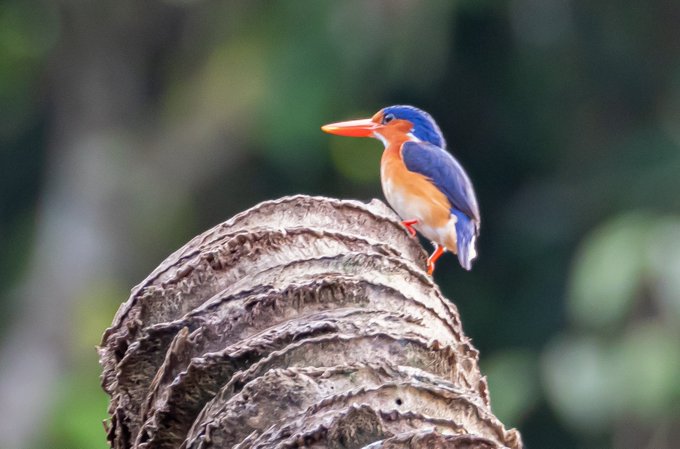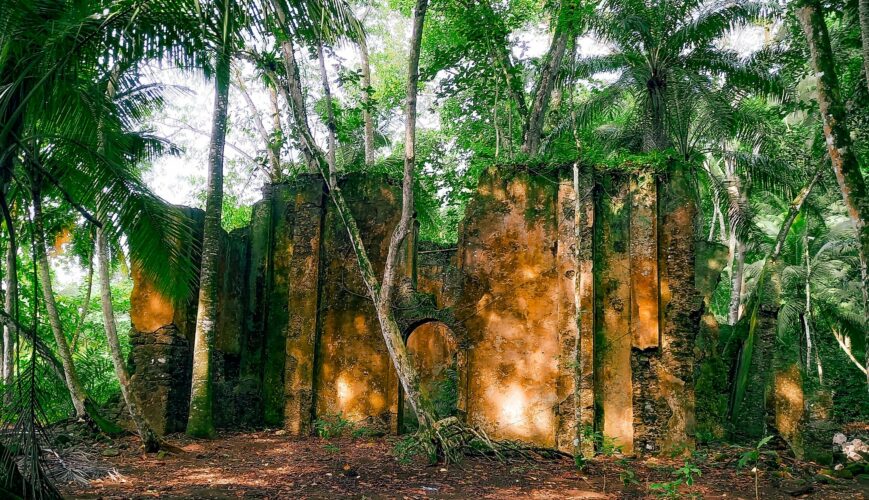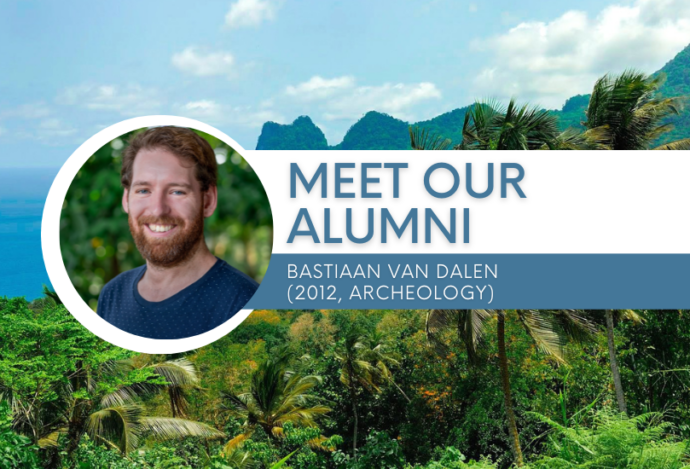Alumnus Bastiaan van Dalen (2012, Archeology) shares how his passion for the unexplored took him to places he never thought he’d go – from a first-generation university student, to completing a PhD while co-founding an archaeological project, Bastiaan is now researching one of the most understudied and undisturbed biodiversity hotspots in the world.

Bastiaan and the team were conducting fieldwork on Príncipe Island this February. (Twitter @PrincipeProject)
Tell us about your journey to Hughes
I grew up in Almere, in the Netherlands. Being a very modern city, with quite a high crime rate, it has a bad reputation in my home country! Studying was not a common thing in my family; no one had ever been to university until my sister and I, after which we both went on to complete our master’s degrees at Cambridge!
I was never really a model student, and studying didn’t always come easily to me. Many of my friends and teachers from high school were surprised I went to university at all, let alone Cambridge and Oxford! Nevertheless, I have always had a fascination for the unexplored – human culture, and nature, so I went to study archaeology at the University of Amsterdam – it was an easy choice for me, although not the most obvious choice to everyone else!
When studying for my Bachelor’s in Archaeology, I became really excited by what we were learning and started to get high grades. Even so, I would have never even in my right mind considered Cambridge a serious and feasible option if it were not for my visit to my sister, who was studying at Darwin College.
This experience changed everything. I fell in love with Cambridge, and spoke with an archaeology professor at her college who made me realise that I could actually apply. Directly after coming back, I started work on my application.
What was your time at Cambridge like?
I was just blown away by the magical experience to be honest. Everything was so different to what I was used to.
Moving countries was definitely quite the experience. Although I had travelled a lot, this was my first time living abroad and it was a welcome change from the very modern (only 25 years old) city I grew up in. While it brought with it many challenges, I was lucky to have found a room with a charity on Chesterton Road. It was my ‘home away from home’; I made a lot of friends in Hughes Hall and was actively involved in the Boat Club. I also loved to explore the beautiful colleges with my friends, and tried to go to Formal Hall in as many colleges as I could (I attended them in all but three in the end!).
I was surprised that everything felt so welcoming and accessible. Prior to arriving, I had believed all of the stereotypes about Cambridge, thinking that everyone would come from an elite and wealthy background. I expected to spend a year of my life without friends, working very hard, and being in a surrounding where I would not fit in (elite/fancy/rich etc, all the stereotypes about Cambridge) but the opposite was the case!
A lot of the time I was focused on my studies though, and I finished my degree with a Merit (I had a 70 overall), so I was very happy about that.
What do you do now?
After Cambridge, I went back to the Netherlands and went on a fieldwork project at a world heritage site in Oman, followed by a project in Nicaragua in 2015. At this time I realised I didn’t want to be an archaeologist in the traditional sense. I wanted to make a contribution to address the challenges we are facing in the 21st century.
My travels ended in Oxford where I found out they had the perfect masters program to help me use my experience to make a positive impact in the world.
Long story short, I ended up doing this program from 2016-2018 during which I developed a project for a PhD. I am now in the final year of this PhD (funded by the South, West and Wales Doctoral Training Partnership) and have developed a methodology to comparatively study sustainability, quantitatively and qualitatively, between human societies of the distant and recent past.
I also co-founded Príncipe Past and Present, researching the densely forested Príncipe Island. The project aims to bring to light historical trajectories of environmental change and to understand contemporary human-environment interactions on possibly the most understudied biodiversity hotspot in the world.
Príncipe was uninhabited until the late 1400s, so as one of the few places in the world without human presence throughout the distant past, and hosting a significant proportion of endemic species, Príncipe offers a unique opportunity to study these processes with an unprecedented level of detail. However, what was initially intended as a small side-project has evolved into a full-fledged long-term multi-collaborative project, with exciting prospects for post-doctoral research opportunities.

Príncipe is home to many endemic species – species that are only found in a single geographic area! (Twitter@PrincipeProject)
In early 2023 I went on our first expedition (branded as the Oxford Príncipe Project as it was officially an Oxford University-funded expedition) with a team at the University of Oxford, in collaboration with several institutional researchers, the Max Planck Institute, and local NGO Forever Príncipe.
We are also producing a documentary our expedition, which will highlight the viewpoints of local community members on the topics of sustainability and the environment. Our aim is to submit this film to national and international film festivals to help amplify the voices of the community and promote greater appreciation for the island’s distinctive biodiversity.
Argued to be (possibly) the last country in the world where archaeological research has not yet taken place, and simultaneously being known as the ‘Galapagos of Africa’, the future for this project is looking bright!

“These are the ruins of Ribeira Izé, which is thought to be Príncipe’s first settlement.” – Twitter @PrincipeProject
As for my personal endeavours, I travel a lot and have now visited over fifty different countries, have learned a variety of languages (of which Maya Hieroglyphs is probably the most random one!), and currently live in both Oxford and Alaska. I met my girlfriend in Oxford who now works in Alaska, so every three months, I live with her for three months and work remotely on my PhD. It is an interesting experience for someone who specialized in tropical forest archaeology!
How has your time at Hughes Hall influenced your life now?
Studying at Hughes provided me with the confidence, critical thinking, and experiences to really grasp life and dare to think big. I made lasting friends who I am still in contact with, and it has been the stepping stone for my academic career as well as in some way my personal life as I have led a very exciting life (in my opinion!) ever since matriculating at Cambridge.
A return visit to Hughes Hall is long overdue!
Further information:
With thanks to Bastiaan and the Oxford Príncipe Project Twitter page for use of the images in the article. You can view all images, including fascinating updates on their research, on the project website and twitter pages.
Twitter: @PrincipeProject | Website: Oxford Príncipe Project (principepastandpresent.com)
- If you would like to share your story in our ‘Meet our alumni’ series, please contact the Development Office at development@hughes.cam.ac.uk.
- Alumni Benefits: Alumni benefits – Hughes Hall (cam.ac.uk)
- Follow us on Social Media:
22/05/2023










